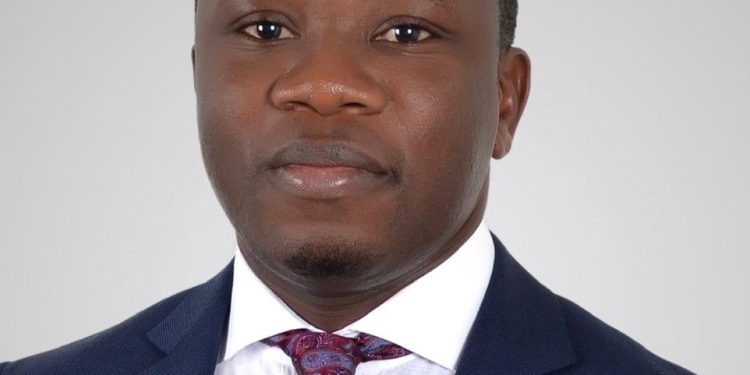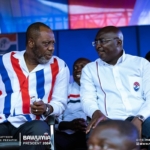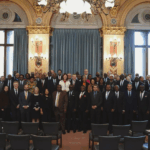
The claims that the current dropping of the oil prices at the pump and the declining of the dollar against the Ghana Cedi is predominantly as a result of some extraordinary economic measures put in place by the President John Mahama-led administration are false.
It is 100% accurate to say that global oil prices have been on a downward trend for some time now. In other words, oil prices on the international market are falling rapidly.
In fact, the low level of prices the world is seeing now, we have not seen that in the last four years since February 2021. For purposes of this analysis, I want us to look at these two commodity trading terminologies: Contango and Backwardation.
For ease of understanding, the petroleum market is said to be in contango when prices of petroleum continue to increase to a point that it can be fair to say prices will continue in the upward manner in the near foreseeable future.
When the market is in contango, petroleum traders buy more than they immediately need so they can store the remaining for sale in the next pricing window so as to make more profit. Such traders therefore will require more dollar each time they buy. Producers also produce more or will be tempted to produce more in order to meet the high demand during contango.
Backwardation on the other hand is when prices of petroleum continue to fall to a point that it can be fair to say prices will continue in the downward trend in the near foreseeable future. When the market is in backwardation, petroleum traders buy only the quantities they require for immediate onward sales.
They cannot afford to store any of the petroleum products as they know the prices will go further down in the next pricing window. During backwardation, the pressure on the dollar will also reduce as traders will not require too many dollars each time they buy.
In the opposite direction to contango, during backwardation, producers tend to cut production so as to create excess demand over supply in an attempt to raise the prices over time.
Currently,, the international oil market is in backwardation! Crude oil is selling on average for around $60 per barrel. In December 2024, the average price was more than $75 per barrel. In January this year, the average price was hovering around $80 per barrel. That records about a 25% reduction in the crude oil price just between January 2025 and May 2025. Industry analysts predict that if all other things remain equal, the crude oil prices could drop to about $40 per barrel sooner rather than later.
Two main factors account for this current decline in international oil prices. Firstly, the trade wars in the form of sweeping tariffs are creating economic uncertainty globally – there is a general belief that, as the tariffs are trade barriers, they could slow down the global economy. Demand for oil is closely correlated with economic prosperity. This is no brainer! When economies are booming, factories are being opened, and people are buying things and going places, oil consumption will automatically increase.
However, when economies slow down, demand for oil will also decline. For the fear of the tariff war implications, traders are not willing to buy a lot of petroleum at the moment, so there is an excess supply over demand in the market, leading to surplus, hence the fall in prices. The second factor is that OPEC+ is flooding the market with more oil than the quantity required. While there are already concerns about a drop in the demand for oil, production is set to rise.
The oil cartel OPEC and its allies, collectively known as OPEC+, have decided to increase the production of oil. But the question is, why? Saudi Arabia, which is seen as the de facto leader, wants OPEC+ members to produce more to bring down the price in an effort to pressure OPEC+ member countries such as Iraq and Kazakhstan to comply with earlier agreed quotas. President Donald Trump has also directly asked OPEC+ to produce more oil to bring down prices because it was part of his campaign message to bring down prices at the pump.
I think I need to throw a bit more of light on who OPEC and OPEC+ really are. OPEC is a permanent, intergovernmental Organization created in Baghdad, Iraq, initially by five countries in 1960. These five countries include Iran, Iraq, Kuwait, Saudi Arabia, and Venezuela. Other oil-rich countries joined OPEC in subsequent years. Currently, there are 12 members, namely Algeria, Congo, Equatorial Guinea, Gabon, Iran, Iraq, Kuwait, Libya, Nigeria, Saudi Arabia, United Arab Emirates, Venezuela. OPEC is headed by a Secretary General on a rotational basis.
The current Secretary General is HE Haitham Al Ghais from Kuwait.
Their primary objectives include but not limited to: a) to co-ordinate and unify petroleum policies among Member Countries b) to secure fair and stable prices for petroleum producers; c) ensure an efficient, economic and regular supply of petroleum to consuming nations; d) create a fair return on capital to those investing in the industry.
In September 2016, an agreement in Algeria, involving 23 oil-exporting countries, including then 13 OPEC members, aimed to reduce oil production to improve market prices. This agreement was termed OPEC+.
OPEC+ includes major oil-producing nations such as Russia, Azerbaijan, Kazakhstan, Bahrain, Malaysia, Mexico, Sudan, and Oman. Despite being around 50 years younger than OPEC, OPEC+ is more powerful due to its control over the richest global oil and natural gas reserves. OPEC+ has observer states: Canada, Egypt, Norway, and Oman. It is estimated that 82% of the world’s proven oil reserves are located within the OPEC+ nations. This is how powerful OPEC+ is.
Talking of why petroleum prices are dropping at the pump in Ghana, I will simply say two main reasons. In the first place, it is established that petroleum prices are dropping globally. As a substantial 97% of Ghana’s refined oil products are imported from the very international market where the prices have fallen, it is not shocking to see a reflection of that in our local pump prices. The second reason is the falling trend of the dollar against the cedi. While importing refined petroleum products to Ghana, almost every aspect of the arrangement is done in the US Dollar.
Fast forward, the key factors that are integrated into the price build-up of the refined products for the final consumer in our domestic market include the landed costs; which encompass all expenses incurred in bringing the refined petroleum products from the international market to the storage tanks in Ghana, plus government taxes which are accumulated to the end-users, BDC and OMC margins.
To be specific, the landed costs include the cost of the products at source, insurance, freight, customs duties, taxes, supplier’s premium, and other related fees and charges on arrival such as Conventional Buoy Mooring (CBM) System fees, Booster Pump Fees, Storage & Loading Rack Fees, Inspection and Verification fees, Ghana Ports & Harbours Authority (GPHA) Charges, Sampling and Analysis for QC fees, Discharge Assistance/Agents Fees, and Operations Facilitation Expenses.
Though the taxes accumulated to the end-users, BDC and OMC margins are calculated in Ghana Cedis, about 99.5% of the total landed costs is quoted in the US Dollar. So, the Bulk Distribution Companies (BDCs) pay for the refined petroleum products in US Dollar and subsequently convert the total amount into the Ghana Cedis prior to quoting prices for the Oil Marketing Companies (OMCs) in Ghana Cedis.
This implies that the exchange rate as at the time of transaction actually determines how much a metric tonne should cost in Ghana Cedis. This is why the falling Dollar rates at the moment directly lead to the reduction in the prices of petroleum products at the pump.
I want to indicate unequivocally that the current dropping of petroleum prices at the pump in Ghana is not as a result of any special or extraordinary measures put in place by the President Mahama-led administration as some people are led to believe.
Because Ghana’s petroleum downstream is running a price deregulation system, the government does not at any point determine the prices of petroleum products in the country. Unlike in some other countries, in Ghana, external suppliers do not go through Competitive Tender Process of any form and there is absolutely no Subsidy System in place.
The government of Ghana does not form Ad hoc Committees to fix the prices of petroleum products, hence, the sector is technically depoliticized and liberalized. Price Deregulation ensures that demand and supply determine the oil prices of refined petroleum products in Ghana. Compounding to that, the National Petroleum Authority (NPA) only has Licensing Authority, Sanction Powers, Monitoring and Evaluation Functions, and Policy Formulation obligations. The only thing NPA has to do with pricing is to set Price Ceilings and Price Floors to prevent monopoly.
People who are making effort to put out there that the current falling oil prices were triggered by government’s deliberate actions, are the same people who literally think the strong performance of the Ghana Cedi against the US Dollar at the moment was orchestrated by the government’s strategic plans. I totally disagree with this assertion as I would want to postulate otherwise.
The strong performance of the Ghana Cedi against the US Dollar has absolutely nothing to do with Dr. Ato Forson’s exceptional prowess in handling the economy nor does it have anything to do with the Bank of Ghana Governor. The Cedi is gaining value by default as we saw within same time frame in the year 2020 when Hon. Ken Ofori-Atta was the Finance Minister and Dr. Ernest Addison was the Governor of Bank of Ghana. At that time, Bloomberg ranked the Ghana Cedi as the best performing currency against the dollar.
The Ghana Cedi’s strong performance in 2020 was triggered by Ghana’s 2020 Eurobond which was successfully oversubscribed by almost 350% as investors hugely bid more than $14 billion as against Ghana’s required $3 billion.
Within the global commodity trading space, any time the international oil market is in backwardation due to a global issue, commodity traders globally divert part of their oil trading funds to trade in other commodities such as gold, cocoa, diamonds, etc. In most cases, when this happens, Ghana automatically becomes one of the biggest beneficiaries as Ghana is Africa’s largest producer and exporter of gold, sixth in the world, and at the same time the world’s second largest exporter of cocoa.
Backwardation in the international crude oil market generally increases demand exponentially for both gold and cocoa, and in fact, creates excess demand over supply for the two commodities, thereby leading to very high prices for both gold and cocoa on the international market.
Take a look at the current situation and you will see that as the crude oil prices on the international market declined from about $80 per barrel in January 2025 to about $60 per barrel in May 2025 with industry experts predicting a possible $40 per barrel in the coming months, gold prices on the other hand have skyrocketed on the international market from an average of $2,175 per ounce in the fourth quarter of 2024 to an all-time high of about $3,300 per ounce in May 2025.
This exponential increment in price amounts to about 51.73% which has eventually given Ghana a whopping $2.3 billion between January 2025 and May 2025 against $1.4 billion for the entire year of 2024. What really increased Ghana’s gold export is the domestic gold purchase programme launched by the erstwhile President Akufo-Addo administration. This same programme increased Ghana’s gold reserves from 8.7 tonnes in 2023 to 31.37 tonnes in January 2025 at the time of handing over to President Mahama.
Ghana’s current gold reserves stand at 31.37 tonnes which implies that the PMMC/Goldbod has only added 0.87 tonnes since the inception of the President Mahama’s administration on January 7, 2025.
Comparatively, on 8 March 2020, Saudi Arabia initiated a price war on oil with Russia, which facilitated a 65% quarterly fall in the price of oil.
The price war was triggered by a breakdown in dialogue between the Organization of the Petroleum Exporting Countries (OPEC) and Russia over proposed oil-production cuts in the midst of the COVID-19 pandemic. Russia walked out of the agreement, leading to the fall of the OPEC+ alliance.
In July 2020, both Brent and WTI crude oil prices experienced significant declines. By the end of the month, Brent futures were trading around $39.45 per barrel, and WTI futures were around $36.36 per barrel. These were some of the lowest levels in over two months, reflecting a drop in demand due to the impact of the COVID-19 pandemic. While the crude oil prices were crushing, in June 2020, gold prices were generally trending upwards, influenced by factors like the COVID-19 pandemic and investor demand for safe-haven assets.
It continued in that trend into July 2020, when the price of gold generally fluctuated, with a noticeable increase towards the end of the month. Specifically, on July 8th, 2020, gold closed at $1,809.88 per ounce. By July 31st, 2020, it had risen to $1,974.00 per ounce, according to Gold Price.
In conclusion, Ghana is currently receiving dollars in abundance from our massive export of gold and cocoa, which are currently trading at very high prices on the international market due to backwardation in the global crude oil market. In addition, the recent staff-level agreement with the IMF on the 4th review, which is expected to lead to the disbursement of $370 million, has automatically forced the business community hoarding the Dollar within Ghana to also release their dollar into the system.
The Bank of Ghana also injected $490 million into the foreign exchange market in April 2025. As the hardship continues in Ghana, most families are heavily depending on their relatives living abroad hence a high level of remittances also flooding the system. With all these happening at the same time, Ghana is currently experiencing excess supply of the Dollar over its demand, which in turn leads to surplus of the Dollar in Ghana and subsequently making way for the decline in the value of the Dollar against the Ghana Cedi.
I am aware of the argument by a cross-section of Ghanaian intelligentsia that if it is because of external factors relating to the Dollar, why is it that the Ghana Cedi is equally doing well against the British Pound and the Euro. My response to those with that school of thought is that first of all, this whole disruption in the currency market is caused by the shift in the commodity market, of which the EU and the UK are not producers of gold nor of cocoa. The Euro and the Pounds are equally chasing safe-haven investments like gold and cocoa.
Mr. Prince Ellis Antsroe is the Chief Executive Officer of the Swift Petrotrade Group (SPG), a Ghanaian-owned international petroleum and petrochemical trading company with offices in Mauritius, the United Arab Emirates, Greece, and in Ghana. He is a professional member of International Association for Energy Economics (IAEE) in Cleveland, Ohio, USA, a member of the Energy Institute, Aberdeen Highlands & Islands branch, Scotland, UK, a member of the Association of International Energy Negotiators (AIEN) in Houston, Texas, USA and a member of Society of Petroleum Engineers (SPE), International. Mr. Antsroe holds an MSc. in Oil and Gas Management from Coventry University and an MBA in Oil and Gas Management from University of Petroleum and Energy Studies, India.
DISCLAIMER: The Views, Comments, Opinions, Contributions and Statements made by Readers and Contributors on this platform do not necessarily represent the views or policy of Multimedia Group Limited.
DISCLAIMER: The Views, Comments, Opinions, Contributions and Statements made by Readers and Contributors on this platform do not necessarily represent the views or policy of Multimedia Group Limited.
- President Commissions 36.5 Million Dollars Hospital In The Tain District
- You Will Not Go Free For Killing An Hard Working MP – Akufo-Addo To MP’s Killer
- I Will Lead You To Victory – Ato Forson Assures NDC Supporters
Visit Our Social Media for More




